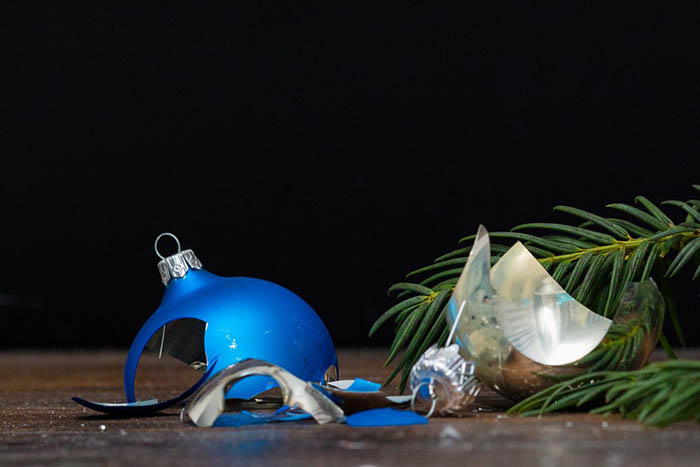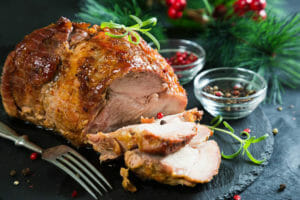’Tis the season to be jolly, and to have your festive follies land you in the emergency room. Holiday cheer can dissolve into tears after any number of seasonal accidents around Christmas time, from falling while hanging lights to cutting yourself with a knife while cooking. Below, we’ve rounded up eight major reasons for the seasonal injuries that often happen in the last few days of December. If you’re working in the ER on or around Christmas Day, keep these causes in mind as you put on your holiday scrubs.
Wrapping and Unwrapping Gifts
As mundane as these tasks seem, wrapping and unwrapping gifts is a major cause of injury around Christmas—and there’s a huge spike in cases on Christmas Day in particular. Knives, scissors, and box cutters can easily slip, resulting in lacerations. Even those awful hard clamshell plastic cases can pose a risk if you catch your skin on a jagged edge. Wrapping gifts can also result in lacerations and even major paper cuts if people aren’t careful. If this sounds silly to you, just wait until you work Christmas morning in the ER and watch the patients come through the door.
Decorating the House
Deck the halls with boughs of holly, but just be sure not to injure yourself in the process. Decorations pose all sorts of dangers. You can shock yourself while putting up lights, fall while hanging a garland over a door, or cut yourself on a broken ornament or figurine. In particular, children can get into a lot of trouble around decorations, such as swallowing small ornaments, hurting themselves on heavy stocking holders, and tripping over ground-level decorations. Keep that in mind when you’re decorating your house, or while you’re treating a patient who injured himself or herself doing these very things.
Hanging the Lights
Hanging lights inside or outside may be a time-honored tradition, but it’s also a dangerous one. Like decorating the house, hanging Christmas lights comes with all sorts of hazards. There’s the obvious risk of falling off a ladder or roof, resulting in bruises, broken bones, and/or a concussion. But you can also throw out your back while reaching up high or blow out your knee while climbing a ladder. Plus, there’s always the chance of cutting yourself on a broken bulb or shocking yourself with electricity when you plug in the lights. Around Christmas time, you may find yourself wishing your patients had simply put some battery-powered candles in the window and left it at that.
Trimming a Christmas tree holds all the dangers of putting up decorations and hanging Christmas lights, all at once. If you manage not to throw out your back or pull a muscle while getting the tree into the house and setting it up in the stand, there’s still the possibility of falling off the ladder while you drape the lights or put on the tree topper. Of course, you can shock yourself while plugging in the lights as well. If you get through that unscathed, there’s still the chance that you will cut yourself on a busted ornament or lightbulb or trip on the tree skirt. Trimming a tree is all fun and games, until it isn’t.
Getting the Flu
Okay, so the flu isn’t related to Christmas directly, but December does fall right within the window for flu season. (The extended flu season for 2017-2018 lasted all the way from November to March and was the worst outbreak in the U.S. in almost a decade.) Flu viruses will already be circulating by Christmas, and the stress and travel of the holiday can wear down people’s immune systems, making them more prone to contracting the flu. Expect to see severe cases of the flu starting in November and continuing through the rest of the winter holidays, including Christmas—and be sure to encourage any healthy patients you see to get the vaccine!
Cooking the Food
Cooking that delicious Christmas dinner can also prove harmful to your health. Knife lacerations are a common injury around the holidays, as cooks are often distracted while chopping and inexperienced chefs find themselves pressed into cutting vegetables. Burns also happen often due to splattered oil or gravy, as well as brushing up against a hot pan or stovetop burner unknowingly. Less common are full-on cooking fires, which are thankfully more rare but more serious when they do occur. Come Christmas, you’ll probably find yourself patching up more than one overambitious chef, so brush up on your burn and wound care skills.
You’ve managed to get through cooking all the food without burning or lacerating yourself, so you’re home scot-free, right? Wrong. Food poisoning can happen during holidays due to undercooked meat–which harbors salmonella–or any dishes left at room temperature for too long, which allows nasty bacteria to grow. There’s a high likelihood you’ll see patients with nausea, vomiting, diarrhea, abdominal cramps, and/or fever, all classic signs of food poisoning. You might also get some cases of more mild gastrointestinal distress (“mild” being relative) with symptoms such as severe gas, bloating, constipation, and abdominal pain. Traditional Christmas dishes are full of fats, oils, sugars, spices, and other irritants, and many people overindulge on the holiday, leading to seriously upset stomachs.
Drinking Too Much
Just as many people overindulge in food over the holidays, so they also overindulge in alcohol. While alcohol-related incidents are a bit more common on New Year’s Eve, many people also imbibe to excess during other winter holidays, including Christmas. Drunk driving is obviously a major concern, but plenty of other minor mishaps can result from drunkenness, such as slips, falls, and injuries caused by sluggish reflexes.
While some of these resulting injuries might not be so different from ER visits the other 11 months out of the year, it helps to know the possible cases that might walk through the door, especially if you’ve never worked a holiday shift in the ER before. Keep these eight injuries in mind as you treat patients, and consider rewarding yourself with a nice Christmas gift, such as sturdy nursing shoes or a new stethoscope once you get through the craziness of holiday injury season.
- Five Unusual Nursing Jobs: Is One of Them Right for You? - May 6, 2022
- 5 Specialty Career Choices for Nurses - December 20, 2021
- 4 Tips for a Successful Nursing Orientation - December 13, 2021





